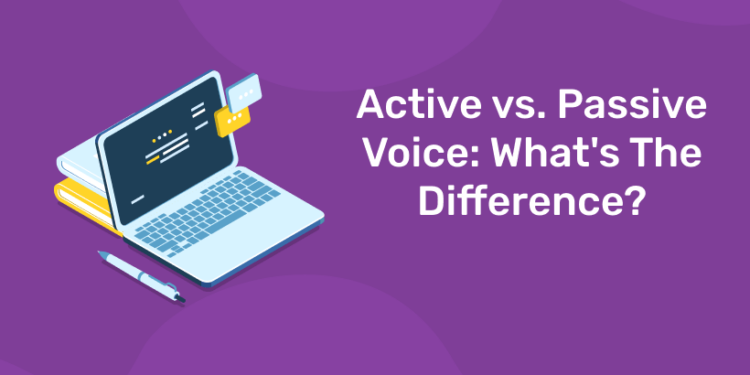Table of Contents
Knowing the difference between the active voice and the passive voice can make much difference in your language usage. The English language has two voices per se, namely active and passive voices. They are an inevitable part of language and grammatical studies. Active and passive voice can make much difference to your sentences. Confusing active and passive voices is a common error committed by the students and the speakers while they are writing and speaking about some things. It is high time to draw a line between active and passive voice. Learn easily and quickly reading this article about the important difference between the active and teh passive voice.
Take a look at an easy sentence like “I want an apple now.” The sentence is straightforward and precise. The readers or the listeners can directly identify that the subject is an ” I”;” wants” verb and “an apple” object. Now, convert this sentence, reversing it so that the object can occupy the place and position of the subject and it sounds like “An apple is wanted by me now.” The sentence is not only quite longer than the previous sentence but it is also a better-disconnected roundabout, and negligibly uncoordinated too. The above-given sentences are the basic examples of the active and passive voice in English.
There are many skills and techniques that the speakers need to accumulate to convert themselves into active and effective speakers and writers. When a sentence is in the active voice, the subject of the sentence is the one doing the action described by the verb. In the passive voice, the subject is the individual or thing operated on or influenced by the verb’s action.
The passive voice is usually constructed by using the be a form of the verb such as is, was, or has been, or have been and the past participle of the verb, as in “The stone was thrown by Mike.” Although periodically rebuked for being reserved, the passive voice can also be pretty much reasonable when somebody likes to highlight an activity that has been carried by someone or when the voice of the activity is unidentified. The news coverages usually use passive voice instead of active voice.
The active voice claims that the individual or thing denoted by the grammatical subject executes the act described by the verb. The passive voice creates the subject the individual or thing operated on or influenced by the activity illustrated by the verb. Let’s see an example to prove the definition of the active and passive voice
Active voice: Tom crashed over the wall.
Passive voice: The wall was crashed over by Jerry.
Both sentences depict the exact activity brooking Tom crashing over the wall and causing himself to fall over with the foremost sentence making Tom the subject and the second creating the wall making the wall the subject. The passive voice is often differentiated from the active voice by its use of a linking verb form heeded by another verb in its past participle format.
Ace to the basic steps to improve pronunciation in English here!
Active voice
In the active voice, the sentence’s subject executes the action. Here are two examples of sentences in the active voice:
Shira likes adventures.
She loves moonlight.
No matter what verb you operate, structuring your sentence so the subject conducts the verb is reporting in the active voice. The major difference between active and passive voice is that in active voice, the sentence has a direct, calm, and pure tone when compared to the passive voice. The writers can use it if the sentence is asking the readers to pay more attention to the subject and the focus should be placed along with the subject in your sentence. The action is given second place importance when compared to the subject.
Passive voice
1: Which of the sentences below is grammatically correct?
In the passive voice, the action’s mark is the priority and the verb functions upon the subject. Or in other words, the subject is operated upon by the verb. Every sentence in the passive voice possesses two verbs namely A conjugated form of “to be along with the main verb’s past participle. The above-given sentences can be rewritten in passive voices
Adventure is liked by Shira; Moonlight is loved by her. The sentences in the passive voice are longer than sentences in the active voice. The reason for such a difference is very simple as the passive voice has many more things to include other than the main verb like prepositions.
Lollipops are [conjugated form of “to be”] loved [past participle of the main verb] by [preposition] Meera.
The passive voice has a more nuanced tone than the active voice has. When you want your reader to concentrate on the activity being discussed or the action’s mark rather than on who or what is executing the action. The objective presentation is the major feature of the passive voice. Both passive and active voices are necessary for English sentence making. Learn the basic differences here start writing sentences in active and passive voice here.
Spoken English Course for Guaranteed Confidence and Career Growth
Spoken English Course by Entri App: Enhance your communication skills, gain certification, and boost your career with confidence.
Join Now!Difference between Active and Passive Voice
Passive voice usually obtains derided as a feeble and reserved form of presentation. If the speaker or writer enjoys stress or emphasizes the presence of an action taking place and the emphasis should be given to that particular action rather than who committed the act. It is also valuable when the doer of an action is unknown to the listeners or the writer or the speaker himself or herself.
Active voice: The grandchildren have mopped the kitchen.
Passive voice: The kitchen has been mopped.
Active voice: We found a rare butterfly in the courtyard.
Passive voice: A rare butterfly was found in the courtyard.
The distinctions between active and passive voice arrive as a subject for debate in the complaint of news range. When information media accounts happenings of corruption, they will usually use headlines that give more importance to the passive voice.
The passive voice permits for a more straightforward headline along with including the knowledge that is clear and known to the listeners.
The explanation for the passive is applicable. The passive voice can be helpful in many ways as the listeners who listen to the passive voice can understand the depth of the sentences.
The passive voice calls out an event as a mechanism for describing the getaway of obligation, for example, “Mistakes were made” rather than “We made some mistakes.” The passive voice is often criticized by people and the language researchers for recognizing what seems to be a hindrance of accountability on the individual who accepts the action preferably than the individual who commits it. There are many instances where passive voice can be regarded as active but the service vocabulary dissociates the performer from the activity being performed.
“The phone fell over” is an active voice, but it senses like a passive report because there is no obvious causative agent present in the sentence like the previous sentences that we have discussed above. In the active voice, the subject is conducting an action, for example,
The cat chases the rat.
In this sentence the subject is the cat and it’s performing the function, the act of chasing the target of the action that is nothing other than the rat. This sentence is an example of the effective, simple, and direct use of active voice in conveying the meaning of a particular action.
In the passive voice, the activity’s target, the rat, is placed foremost as the principle of the sentence. The sentence
gets converted, and the subject is now being worked upon by the verb. In other words, the subject is passive in the sentence. For instance, The rat is being chased by the cat. The same idea is conveyed through 2 different voices. Active and passive are the two grammatical voices in English. Each of the voices is conformed to specific types of writing. The news reports and the writers always choose the active voice over the passive voice. The teachers may scold children for using passive voice at a stretch making the sentences seemingly more lengthy and clumsy, the passive voices have their own basic and useful functions.
Aspirants who wish to improve their English grammar and wish to enrich their skills in writing and speaking English can make use of the English classes provided by Entri App. The English live sessions can boost your confidence and helps you to acquire basic language skills. Those enthusiastic learners who wish to excel in English should make use of this golden opportunity without thinking twice.










